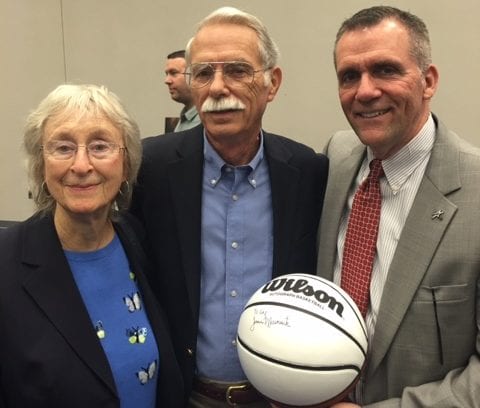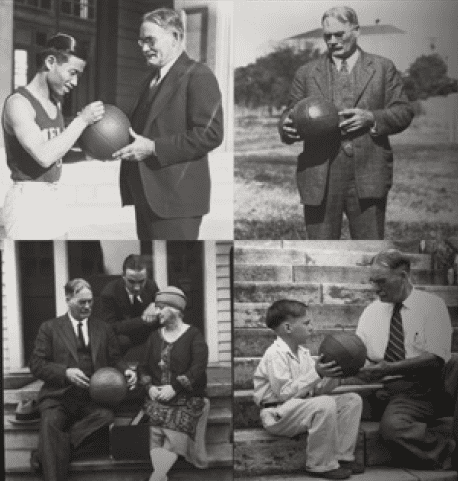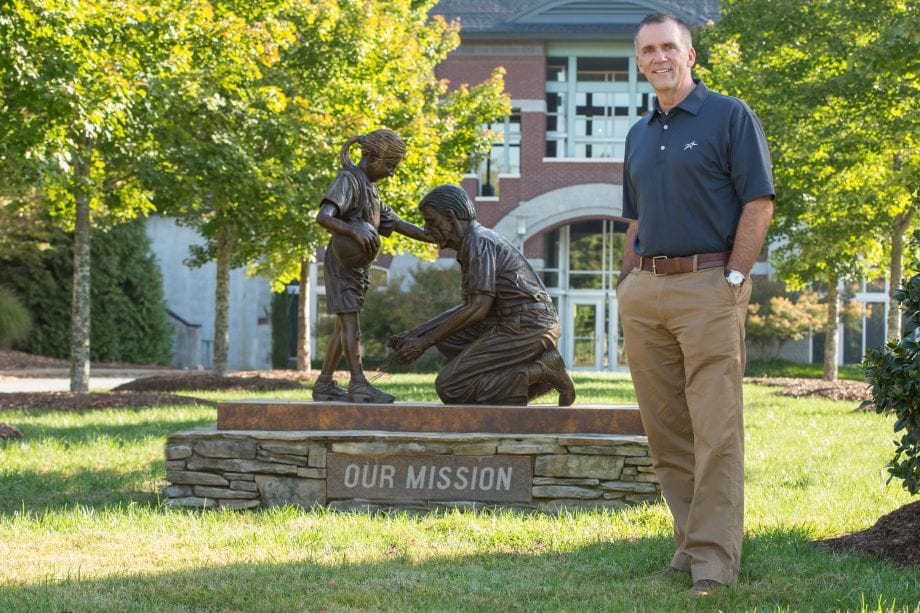This story appears in the Winter 2017 issue of Sports Spectrum Magazine. To subscribe, click here.
An Upward Vision
Dr. James Naismith invented basketball as a way to reach young people for Jesus. That same vision is fueling Upward Sports, the world’s largest Christian youth sports organization
Caz McCaslin went on a mission. After hearing Jim Naismith get interviewed at the Legends of the Hardwood Breakfast during the 2016 Final Four in Houston, McCaslin made it a point to meet the last living grandson of Dr. James Naismith, the inventor of basketball. In junior high, McCaslin did a school report on the origin of his favorite sport. How cool would it be to shake the hand of Naismith’s grandson?
As McCaslin introduced himself to Jim and his wife, Beverly, she noticed the star lapel pin on McCaslin’s sport coat. “Are you with Upward?” she asked.
“Yes, I am,” McCaslin replied. He was actually the founder of Upward Sports, the world’s largest Christian youth sports organization.
Jim and Beverly proceeded to detail how all five of their grandkids played in Upward leagues, and how their son, son-in-law and daughter-in-law all coached Upward teams at one time or another. They loved the personal way Upward coaches worked with the children, how breaks in the games were spent reading Scripture or praying, and the positive atmosphere surrounding the teams. They lauded the organization’s stated mission: “Promoting the discovery of Jesus through sports.”
Then Beverly paid McCaslin a compliment that sent chills down his back.
“That is the one program that we know of that does basketball the way James Naismith intended for it to be done — reaching young people for Christ through a sport,” she said.
The always affable McCaslin was speechless. “I almost fell out of my chair,” he says now. “Coming from them, it just meant the world to me.”
It was 30 years earlier that McCaslin’s world began to come into focus. He was hired in 1986 as the minister of recreation for First Baptist Church in Spartanburg, S.C., and his first endeavor was to launch a youth basketball league. He thought sports could be one of the church’s greatest outreach tools. That notion was quickly confirmed. Within five years the league had more than 500 kids and ran out of room.
So in 1995, McCaslin launched Upward Sports. He figured their model could work for many local churches. Once again, the notion was quickly confirmed. Within five years, more than 300 sports leagues — featuring more than just basketball — had popped up around the country.
It became abundantly clear that sports could be one of the most powerful outreach tools for a local church. And it’s the same vision laid out by the inventor of basketball more than 125 years earlier.

L-R: Beverly and Jim Naismith with Caz McCaslin.
***
Born in 1861 in Ontario, Canada, James Naismith always loved sports. He competed in football, lacrosse, rugby, soccer and gymnastics while earning a physical education degree at McGill University in Montreal. From there he followed another passion — his Christian faith — to earn a diploma from McGill’s Presbyterian College of Theology. He then sought to combine sports and faith with even more education at the YMCA International Training School in Springfield, Mass.
The Young Men’s Christian Association was founded in 1844 in London to be “a refuge of Bible study and prayer for young men seeking escape from the hazards of life on the streets.” That lined right up with Naismith’s desire to develop young men spiritually and physically. And with YMCAs popping up all over the world, instructors were needed.
In December 1891, Naismith was tasked with developing a game to be played indoors, in a relatively small space, to keep his class of future YMCA instructors occupied during the winter. He didn’t want it to be as rough as rugby and football, so a soft soccer ball was used and the goals were placed high above the ground. Two peach baskets were nailed to the bottom of a second-level running track on either end of the gym. To score, he instructed the players to toss a soft shot, like one effectively used in one of Naismith’s favorite childhood games, Duck on a Rock. He wrote up 13 rules, showed them to the students, and tipped off the first ever game of “basket ball.”
“The boys began tackling, kicking and punching in the clinches,” Naismith said in a 1939 radio interview. “They ended up in a free-for-all in the middle of the gym floor.”
So some rule changes were needed, the most important being no running with the ball. The chaos ceased. The boys caught on and began to excel. Soon thereafter, they went out and taught the game at other YMCAs.
In 1898, Naismith accepted a job at the University of Kansas to be a chapel director and P.E. teacher, but he also started a men’s basketball program. KU initially competed against local YMCA squads, but within a couple years, enough college teams had formed to begin playing intercollegiate basketball games. By 1904, after some more rules modifications, it was a demonstration sport at the Olympics.
Naismith was taken aback by the popularity of the game, and in awe when it was accepted as an official Olympic sport. At 74 years old, he witnessed his game being played at the 1936 Berlin Games, handing out medals to the top teams: gold for the United States, silver for Canada and bronze for Mexico.
Today, only soccer is more popular worldwide than basketball.
Born the same year as the Berlin Games was one of Naismith’s 17 grandchildren. The youngest of his five kids was James Sherman, who later had a son he named James Pomeroy. Now 81, James P. (Jim) is the last living grandson of Dr. Naismith.
Jim was 3 when his famous grandfather passed away, but he now takes pride in carrying on the family legacy. He was never much interested in basketball, but as a follower of Christ, he enjoys knowing the game was created because “Granddad” wanted to teach young people about Jesus.
“He [could] see a potential for an outreach, a Christian outreach to young people using competitive sports, and it is perfectly clear that he himself loved competitive sports,” Jim says, adding, “If you can take something you love and apply it not only to your life, but through outreach to give others a better life, now that’s a really good vision.”
It’s a vision McCaslin shares. “It didn’t really register with me that [basketball] was ministry oriented until I was called into the ministry,” he says. “I really started looking deeper into basketball and when I realized why basketball was created, it just lit me up. It was so exciting to hear that the sport that I loved the most was designed for the purpose of sharing Jesus with kids.”

Dr. James Naismith (Photos courtesy of University Archives, Kenneth Spencer Research Library, University of Kansas)
***
The beginning of Upward Sports can be traced to a broken pole vault pole.
McCaslin was a lean, 175-pound sophomore basketball player in 1978 competing on the Osborne High track team in Marietta, Ga., simply because he wanted to dunk a basketball. Like many other teenage boys, he entertained visions of one day joining the NBA.
Not interested in running, McCaslin opted for all the jumping events, like high jump, triple jump and broad jump. Knowing few kids were competing in pole vault, McCaslin’s coach convinced him to try that as well. Any points there could be the difference between his school winning and losing a track meet.
There was just one problem. “I didn’t have a lot of — actually I had none, zero — upper body strength, and so I couldn’t even bend the pole,” McCaslin says. “I mean, I looked like a wounded cat trying to get over the bar.”
So his coach fetched a pole designed for a smaller athlete. “When I stuck it in the ground, it bent like a piece of spaghetti. It threw me over the bar. It was hilarious to watch; it was so funny,” McCaslin says. “But strangely enough, I would get over the bar multiple times, and sometimes win the pole vaulting because nobody else was pole vaulting.”
Around this same time, former professional football and baseball star John “Bull” Bramlett came to preach at McCaslin’s church. Also called the “Meanest Man in Football” because of his aggressive play on the field and wild actions off it, Bramlett became a Christian after retiring from the NFL. His new life in Christ led him to launch his own ministry and speak at hundreds of churches, schools, prisons, conventions and chapel services.
“I’m telling you, he was lighting my fire,” McCaslin says. “He said, ‘Man, it’s all about the money and the cars and the houses and the motorcycles and the boats,’ and I’m like, ‘Sign me up. I’m ready. Let’s do this.’ And then he got all the way to the pinnacle [of his message] and he said, ‘I had everything I ever wanted, and it was at that moment when I realized I was the most unhappy I’d ever been.’
“And he said, ‘Praise the Lord there was somebody there that told me what would give me real joy and real peace, and he introduced me to Jesus. And it changed my life.’”
McCaslin couldn’t wait for the altar call, to walk up to the stage and accept Christ himself. And in the days that followed, he began praying, “OK Lord, whatever you want me to do with these athletic skills, I want to give them to you. I want to do just like [Bramlett] did.’”
Back on the track, as McCaslin began gaining confidence, the county meet rolled around. He found himself up against “really serious pole vaulters, which I was not.” He wanted to go home, but his coach talked him into staying. McCaslin soon was attempting to surpass 11, 12 feet — higher than he’d ever tried before.
“I stuck that pole in there, and about the third time, the pole broke, because it was not meant for me,” he recalls. “And I landed directly on my [left] knee and shattered my knee cap.”
As a result, McCaslin missed his entire junior season of basketball — the year he was supposed to become a star, attract scouts and land a scholarship. He returned for his senior season, but wasn’t able to match the level at which he played as a sophomore. His NBA dreams withered.
“I thought, ‘Hey, wait a minute. I thought we had a deal: I was going to play in the pros, I was going to share Jesus.’ And He said, ‘I’ve got a bigger plan. I want you to do something else.’ I struggled there for a while trying to figure out how I was ever going to be able to use sports as a ministry when sports was taken away from me because of an injury,” McCaslin says.

Caz McCaslin
***
McCaslin gained some direction after high school when his youth minister, knowing well the kid’s love for Jesus and sports, suggested he set out to become a minister of recreation. He took McCaslin to a nearby church that had a gym and recreation program. McCaslin was awed — and convicted. He found his calling.
His first initiative on staff at First Baptist in Spartanburg was to start the children’s basketball league. One hundred and fifty kids signed up that first year. By Year 5 there were 520 kids with games played on both Fridays and Saturdays. But that was the max. The league couldn’t accommodate any more kids, so 27 sat on a waiting list.
McCaslin was ecstatic over the league’s success — until his wife, Leslie, subtly brought him back down to earth. “We didn’t get in this to turn kids away,” she said. “We got in this to reach kids.”
With new perspective only a loving wife can provide, McCaslin set forth to figure out how to reach anybody and everybody in his community. So he approached a man in the church who had previously helped fund some facilities upgrades. McCaslin asked him if he’d help them build another gym. “You don’t need another gym,” the man said. “You need a thousand gyms.”
“That moment was really quite the vision-stretching moment for us,” McCaslin, 55, says now. “And it was 1995 when Leslie and I left the church and we started this not-for-profit called Upward Sports. That first year I went to seven of my friends in five different states and just asked them if they would try [starting a league], and it worked in all of them. And the next year we had 64 [leagues]. And the year after that we had 127 and then 230 and 340 and 440.”
Within eight years, Upward Sports had its 1,000 gyms. Within three more years, it had 2,000 gyms. It’s now in 47 states having served more than 7 million kids playing basketball, flag football, baseball, softball, soccer, volleyball and even cheerleading.
Yet, Upward is about more than just youths playing sports. The organization’s focus is on what it calls the 360 Progression: “Development of the total athlete mentally, athletically, spiritually and socially, applied intentionally through all Upward Sports programming.” Experienced coaches lead kindergartners through sixth graders in the game discovery stage; second through eighth graders in the development stage; and fourth through 12th graders in the performance stage — all while using Christ as a model to create positive sportsmanship and character.
“I honestly and truly do not know of another way or place or opportunity where people can build friendships, and where there’s no racial barriers, there’s no financial barriers, there’s no cultural barriers,” McCaslin says. “When you throw a ball out on a field or a court, everybody has something in common. And it just creates opportunities to build trusted relationships. Ninety-five percent of all the people in this world, they come to know Jesus because of a trusted relationship with somebody that they know. So it starts with the trusted relationship.”
According to McCaslin’s research, 75 percent of Americans watch, read about or participate in sports once a week, and 98 percent do it once a month. “There are few greater wide-reaching equalizers in ministry strategy as sports,” he says.
Some churches decide not to do sports ministry, however, because those playing don’t come to their church. The Naismiths noticed this with their grandkids’ leagues — out of about 500 kids, maybe 60 were from families involved in the church. But their reaction was the same as McCaslin’s: “This is a really great outreach.”
“The truth is they do come to their church,” McCaslin says. “They just happen to come on Saturday. If the goal of the Church is to get people coming on Sundays, the first step has to be ministering them when they show up on Tuesday evening or Saturday afternoons. Upward Sports is not a program for the Church, it’s a strategy for the Church to reach its community.”
People are looking for genuine relationships, McCaslin insists. “Are they more likely to have those sitting with other fans at a Saturday basketball game or sitting with people in a pew on Sunday?” he asks. McCaslin says there are 60,000 gyms attached to churches in America. That means churches have the facilities but may not realize they’re sitting on an incredible asset to reach their community for Christ.
McCaslin isn’t just trying to grow his organization. He’s trying to grow the crowds in Heaven.
“We have got to start doing things that are creating intentional opportunities to create trusted relationships with people that don’t go to church,” he says. “They’re searching for the truth and they don’t even know it.”
Sports are an intentional opportunity. They have been for decades. That’s what drives McCaslin, and what drove Dr. Naismith more than 125 years ago. If the inventor of basketball could see what Upward Sports is doing today, his grandson believes he’d be proud.
“I honestly think if Granddad was sitting on the side,” Jim says, “he’d be smiling. ‘This is what I had in mind, guys and gals. Keep going. Keep going.’”

Upward Sports
HOW UPWARD IS IMPACTING CHURCHES
A church in South Carolina, excited about its upcoming soccer season, was prepping a good plot of land next to the church for games and practices. But construction issues slowed the process. The pastor realized the fields wouldn’t be ready in time, yet he didn’t cancel the league. Instead, he drove around to area churches and found one with a good field beside it. He approached the church — and its pastor was excited to offer the fields for soccer.
The pastor running the league didn’t allow the loss of his own fields to distract his vision for reaching kids in his community for Christ. He’s noticed that while church growth is slowing, the number of families showing up for games on Saturdays keeps increasing.
***
A pastor moved from Pennsylvania to Kentucky, and he wanted to launch Upward with his new church. A local YMCA was on the verge of shutting down, meaning 300 kids would no longer have a basketball league. The pastor saw an opportunity to fill a recreation sports void. After reaching out to five other area churches, the pastor began an Upward basketball league using the churches’ gyms.
The pastor hoped to bring back most of who would have played at the YMCA. But God had bigger plans. As of mid-November, more than 850 had signed up and the list is growing. All because one pastor had a vision to serve the community and bring church unity, and a group of pastors sought not to transform their church, but to transform their community.



